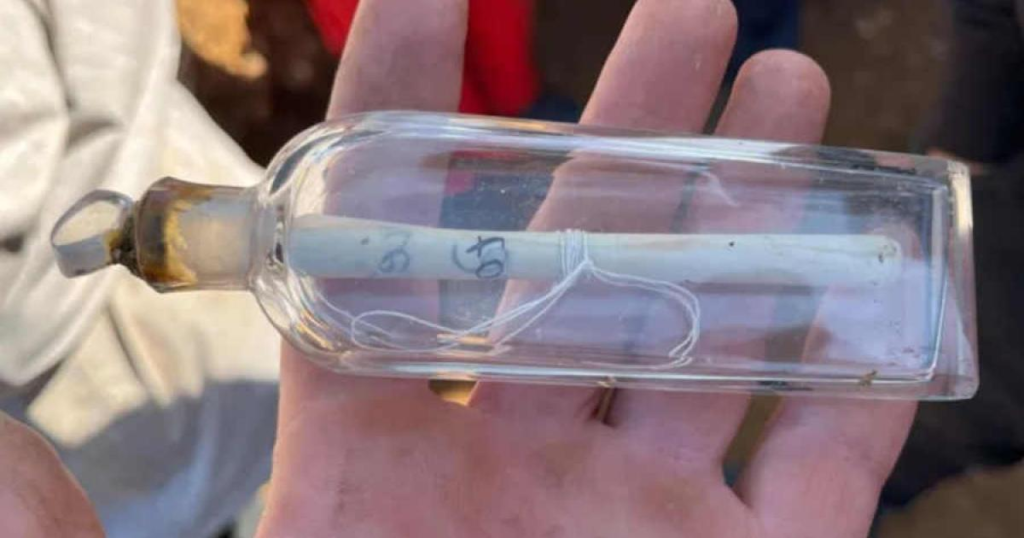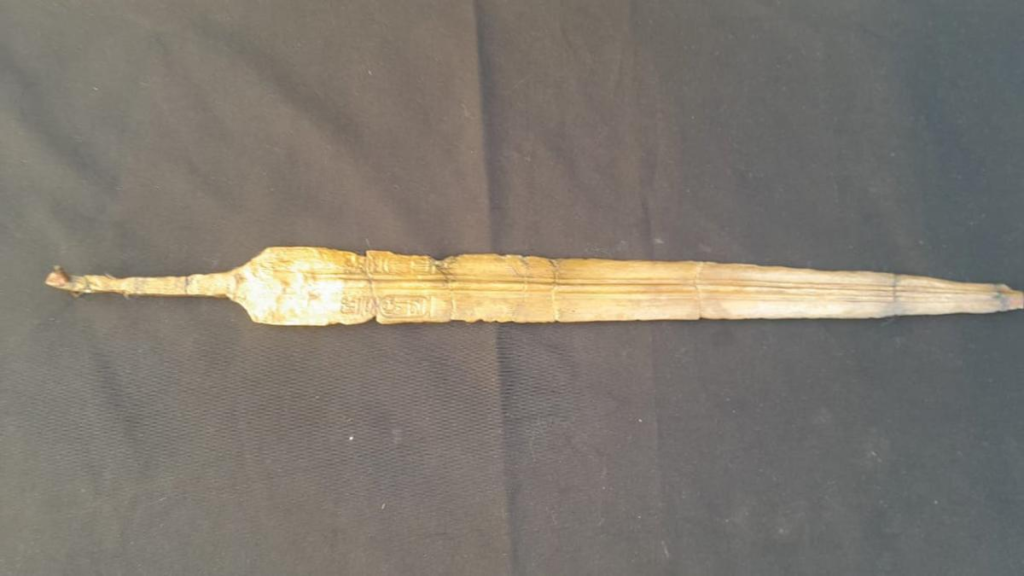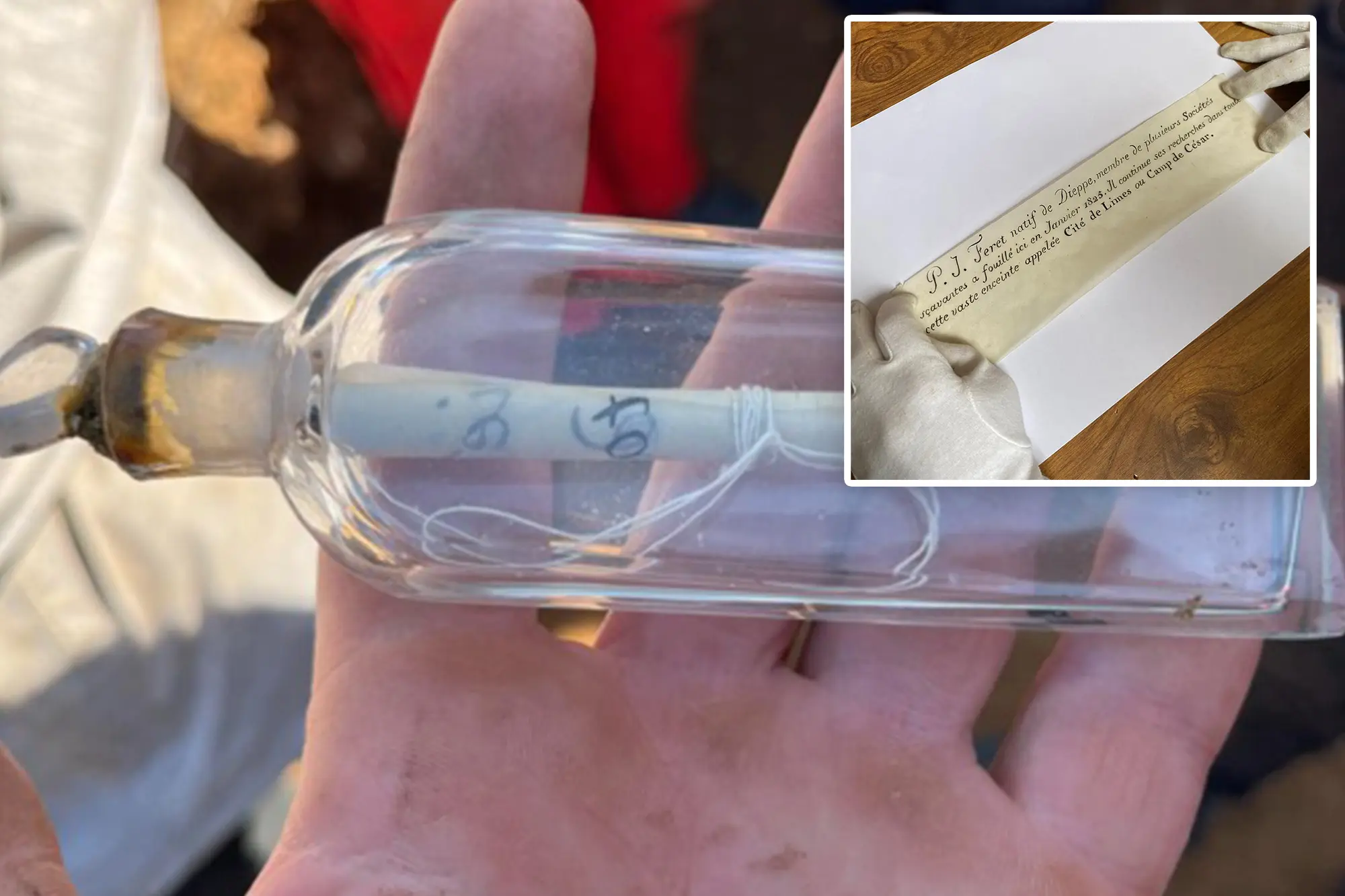In a stunning archaeological find, a 200-year-old message in a bottle has been uncovered by a group of volunteers during an emergency excavation in Normandy, France.
This remarkable discovery offers a fascinating glimpse into the past, revealing insights into the work of early archaeologists and the historical significance of an ancient Gaulish village near the town of Eu.
The glass bottle, containing a neatly rolled-up letter, was found at an excavation site earlier this week. As the volunteers diligently worked through layers of history, they stumbled upon this unexpected treasure that breathed life into the narratives of yesteryear.
Read : France: Where Every Corner Tells a Story of Beauty and Tradition
The letter, dated back to January 1825, unveiled the activities of P.J. Féret, a native of Dieppe and an active member of various intellectual societies.

Féret’s letter detailed his excavations in a vast area known as the Cité de Limes, also referred to as Caesar’s Camp. This nomenclature connects the site to the Roman era, hinting at its historical importance and the layers of civilization that have existed there.
The contents of the letter highlighted Féret’s commitment to uncovering the mysteries of this ancient site, showcasing the passion and dedication of early archaeologists.
The Legacy of P.J. Féret
P.J. Féret was more than just an archaeologist; he was a local notable who played a significant role in the early exploration of France’s rich history. His work in the early 19th century laid the groundwork for modern archaeological practices.
Read : Wine, Romance, and More: France’s Enchanting Travel Hotspots
The municipal records from the town of Eu confirm that Féret first conducted excavations at this site 200 years ago, marking him as a pioneer in the study of Gaulish history.
Guillaume Blondel, the leader of the volunteer group and head of the archaeological service for the town of Eu, described the moment of discovery as “absolutely magical.” He explained, “We knew there had been excavations here in the past, but to find this 200-year-old message… it was a total surprise.”

This sentiment captures the thrill of archaeological work—the chance to connect with the past and understand the lives of those who came before us.
The Contents of the Letter
The letter found inside the glass bottle contains valuable information about the excavation site and its significance. Féret wrote, “P.J Féret, a native of Dieppe, member of various intellectual societies, carried out excavations here in January 1825.
He continues his investigations in this vast area known as the Cité de Limes or Caesar’s Camp.” This simple yet profound statement encapsulates the essence of archaeological exploration and the pursuit of knowledge.
Blondel noted the historical context of the discovery, explaining, “We knew it was a Gaulish village. What we don’t know is what went on inside the village. Was it a place of importance?” This question highlights the ongoing mystery surrounding ancient sites and the potential for new discoveries to shed light on historical events and social structures.
The glass bottle itself is a significant artifact, reminiscent of the vials that women used to carry around their necks, often filled with smelling salts. This detail adds a personal touch to the discovery, linking it to the everyday lives of people from the past.
The fact that such a time capsule was preserved for nearly two centuries speaks to the careful craftsmanship of the period and the importance of written communication in historical documentation.
Blondel remarked on the rarity of such discoveries in archaeology, stating, “Sometimes you see these time capsules left behind by carpenters when they build houses.
But it’s very rare in archaeology. Most archaeologists prefer to think that there won’t be anyone coming after them because they’ve done all the work!” This insight underscores the unique nature of this find and the connection it creates between past and present.

Historical Context: Gaulish Civilization
The Cité de Limes, where the excavation took place, was an ancient settlement that provides crucial insights into the Gaulish civilization. Gaul, which encompassed modern-day France and parts of neighboring countries, was rich in culture and history long before the Roman conquest.
Archaeological studies of such sites can reveal much about the social structures, trade practices, and daily lives of the people who inhabited them.
Understanding the significance of Gaulish settlements is essential for appreciating the broader historical narrative of France and its development. The excavation site, along with the 200-year-old message found, contributes to a growing body of knowledge about the complexities of ancient life in this region.
The discovery of the 200-year-old message in a bottle raises exciting possibilities for future archaeological explorations. It serves as a reminder of the importance of preserving and studying historical sites to uncover the stories they hold. Each excavation has the potential to yield new findings that can reshape our understanding of history and the people who lived it.
Guillaume Blondel and his team are motivated by this discovery to continue their work at the site, seeking to answer the questions left by P.J. Féret and uncover more about the ancient Gaulish village. The excitement surrounding this find is a testament to the enduring human curiosity about our past and the ongoing quest for knowledge.
The Role of Volunteers in Archaeology
This discovery also highlights the invaluable contribution of volunteers in the field of archaeology. Many archaeological projects rely on the dedication and passion of individuals who are eager to learn and participate in the uncovering of history.
The work of volunteers not only aids in the physical excavation but also fosters a sense of community and shared purpose in preserving the past.

Blondel emphasized the significance of volunteer involvement, stating, “The enthusiasm and commitment of volunteers play a vital role in archaeological discoveries. Their passion for history and dedication to uncovering the past drive our efforts forward.” This sentiment reflects the collaborative spirit that characterizes many archaeological endeavors.
The unearthing of the 200-year-old message in a bottle from P.J. Féret is more than just an archaeological find; it is a bridge connecting us to our distant past. It serves as a poignant reminder of the efforts made by early archaeologists and the importance of documenting our history.
As researchers continue to explore the site, they carry with them the legacy of those who came before, striving to uncover the mysteries of the ancient world.
This discovery not only enriches our understanding of Gaulish civilization but also highlights the ongoing importance of archaeology in preserving our shared human history.
Each excavation holds the promise of revealing new stories, and as we delve deeper into the past, we ensure that the voices of those who lived before us are not forgotten.

